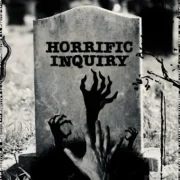PG: PSYCHO GOREMAN: A Film About Order Vs. Chaos
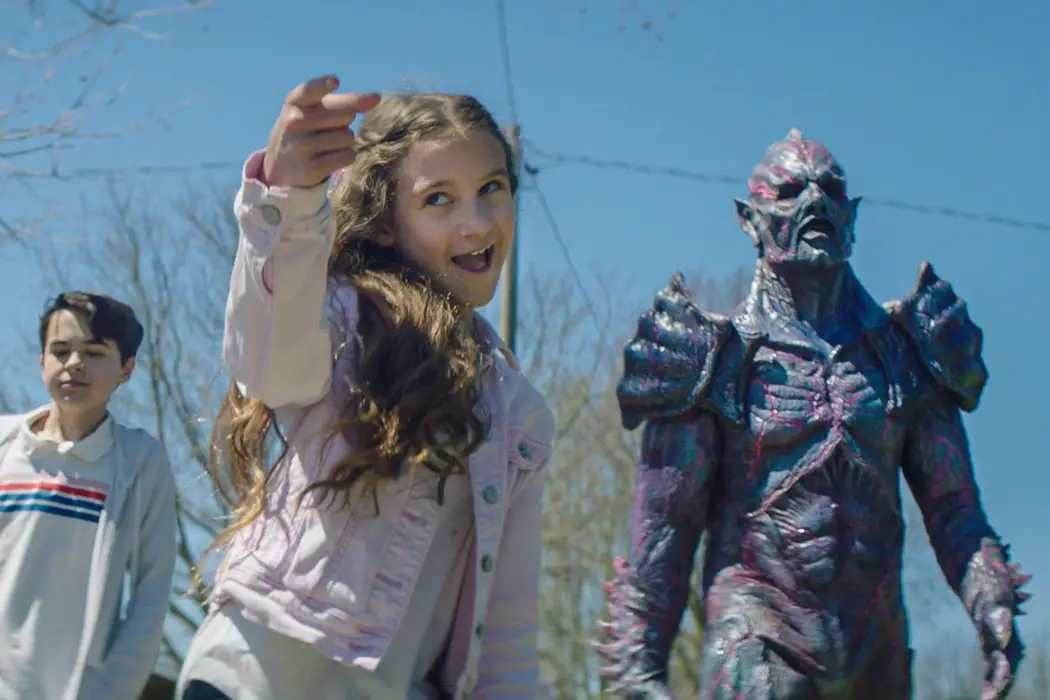
Darryl A. Armstrong works in marketing and advertising and writes…
Popular game designer and Dungeon Master Matthew Colville explains that one of the central tensions in games like Dungeons & Dragons is order versus chaos. He explains this tension can be represented by “civilization versus wilderness. Civilization represents order, the wilderness represents chaos.” This tension is at the heart of PG: Psycho Goreman, a film where a couple of children discover an ancient, nameless evil being, buried in their backyard and imprisoned there by a powerful gem. The nameless creature, dubbed Psycho Goreman by his young discoverers, explains his origins light-years away on the planet Gigax (Gary Gygax being the famous co-creator of Dungeons & Dragons).
A Tromatic Influence
But let’s take a step back before talking too much about the film’s plot and themes. Unless you wind up viewing the film without hearing anything about it or seeing any of its marketing materials, PG is very obviously a movie steeped in the 80s and early 90s nostalgia with a darkly wry sense of humor (“PG…rated R,” notes the trailer). The film might best be described as mining the same general kids-on-a-fantastical-adventure-and-coming-of-age format other recent popular movies and series’ like Netflix’s Stranger Things, It, It Chapter Two, and even Super 8 have explored — by way of Troma Entertainment.
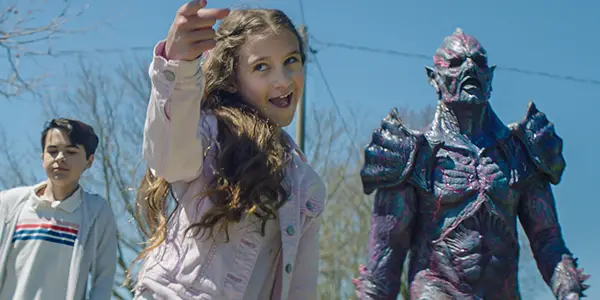
Troma Entertainment, the independent film production company led by Lloyd Kaufman and Michael Herz, is most popularly known for The Toxic Avenger and Class of Nuke ‘Em High film series and Tromeo and Juliet, a retelling of Shakespeare’s Romeo and Juliet co-written by Kaufman and James Gunn (Guardians of the Galaxy). Troma developed a rather specific style that blended comedy, horror, over-the-top grotesqueries, and often less than subtle social activism (pollution, the glamorization of war). This mix of elements is distinctly noticeable in PG, along with other influences like Mechanical Violator Hakaider which director Steven Kostanski (The Void) claims as inspiration.
All of these influences I’ve mentioned and more — from Dungeons & Dragons to irreverent indie film to Japanese Sentai shows — might lead one to expect PG to be a mish-mash of genre elements. And it is. But it is also a ton of fun and quite a bit smarter than one might expect.
Practical Magic (Special Effects)
When sister and brother Mimi and Luke (Nita-Josée Hanna and Owen Myre) unearth and free Psycho Goreman from his prison through a highly unlikely and quite frankly absurd series of events involving a ball game they made up with an incomprehensible set of rules and a 12-ish-year-old boy digging an impossibly large hole in their backyard they come into possession of the Gem of Praxidike, allowing them to control the creature (if you are the type of viewer who insists on realism, this movie likely isn’t for you — but that should have been obvious already). While Goreman is the titular character, the film rests on the back of the young actors Hanna and Myre both practically and thematically. At one point while narrating his origin story—a sequence filled with some of the most fantastical elements in the film—Goreman is unceremoniously interrupted by Mimi spitting out a piece of candy. While it functions as an irreverent joke, it serves to ground the film in the “now”, center the storyline around the two young siblings, and practically demonstrate the narcissistic character of Mimi.
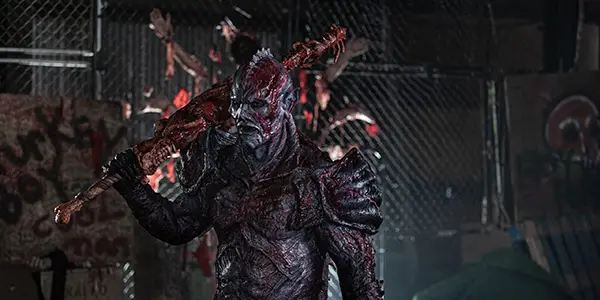
Goreman is a fantastic creation brought to life by Matthew Ninaber who embodies the character, Steven Vlahos who provides the voice, and a first-class makeup and practical special effects crew. Did I mention the film relies heavily on practical special effects? The host of fantasy and science-fiction based characters on display are practical creations — including at least one alien claymation character. Anyone familiar with the host of villainous characters from television shows like Mighty Morphin Power Rangers or Teenage Mutant Ninja Turtles or even from films like The Dark Crystal or the original Star Wars trilogy will find nostalgic joy in these representations. Director Kostanski said he wanted to “give them as much personality in their aesthetic as possible.” And he succeeded — one can imagine their histories and personalities based on their visual representations alone. The Templar Pandora, Goreman’s arch-nemesis, a paladinic being, is an almost robotic entity—set in stark contrast with many of the other meaty, squishy characters — and a perfect example. You can fill in the strictness, the structure, the inflexible ideology that is her basis just by looking at her.
And that brings us back to what this film is about, civilization and wilderness, order and chaos. Goreman was raised and lived under a system of complete captivity and oppression, ruled over by the Templars. But once he came into possession of the Gem of Praxidike he was given immense special powers. Powers strong enough to not just free the inhabitants of his enslaved world, but to travel throughout space and overthrow the Templars and other civilizations that ruled over oppressed beings. Goreman’s rampage throughout the galaxy represents chaotic savagery, a gruesome reaction against the violent order imposed by the Templars. At least until he was once again captured and imprisoned. The religious inspiration for the Templars is plainly obvious, and Goreman’s history is a trope at this point, even if ratcheted up a few fantasy notches. But such stories come from real history—African slaves in the South and Caribbean islands were given edited Bibles that removed sections that might inspire them to rebel.
“I would prefer not to” wrap this up
But Goreman’s story is just the backdrop against Mimi and Luke’s story — a story about Mimi learning how to recognize and come to terms with her own ideological rigidness and force of will she imposes on others. The film deftly packages all of this—if rather unsubtly—in a rude, punk rock package that often flips counter-cultural expectations. Mimi and Luke’s father (Adam Brooks, whose performance showcases his comedic timing), for instance, starts out as the typical incompetent dad but winds up displaying a certain kind of rebellion against the system that reminded me of Bartleby the Scivener from Herman Melville’s short story of the same name (“I would prefer not to,” Bartelby responds to every request from civilized society).
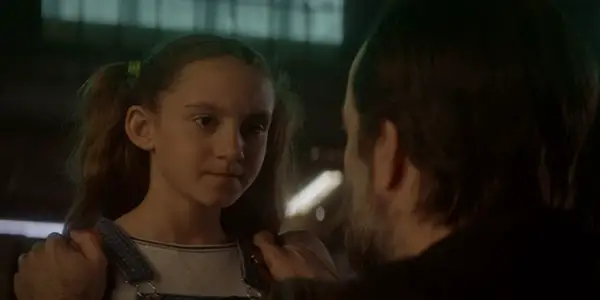
I can easily imagine PG: Psycho Goreman becoming a cult film favorite with its quotable lines, an imaginative cast of fantastical characters, and irreverent attitude. But its strength lies in wrapping all of those elements around a tried-and-true central tension that all of us wrestle with every day.
PG: Psycho Goreman is currently available to stream via rental or purchase on Amazon Prime.
Watch PG: Psycho Goreman
Does content like this matter to you?
Become a Member and support film journalism. Unlock access to all of Film Inquiry`s great articles. Join a community of like-minded readers who are passionate about cinema - get access to our private members Network, give back to independent filmmakers, and more.
Darryl A. Armstrong works in marketing and advertising and writes about pop culture. He is the co-creator of the Cyber Shorts Film Festival, and his work has been featured in Bright Wall/Dark Room, Rise Up Daily, and Image Journal's Arts & Faith Top 100 Films list. He lives in Las Vegas, Nevada with his two children.







